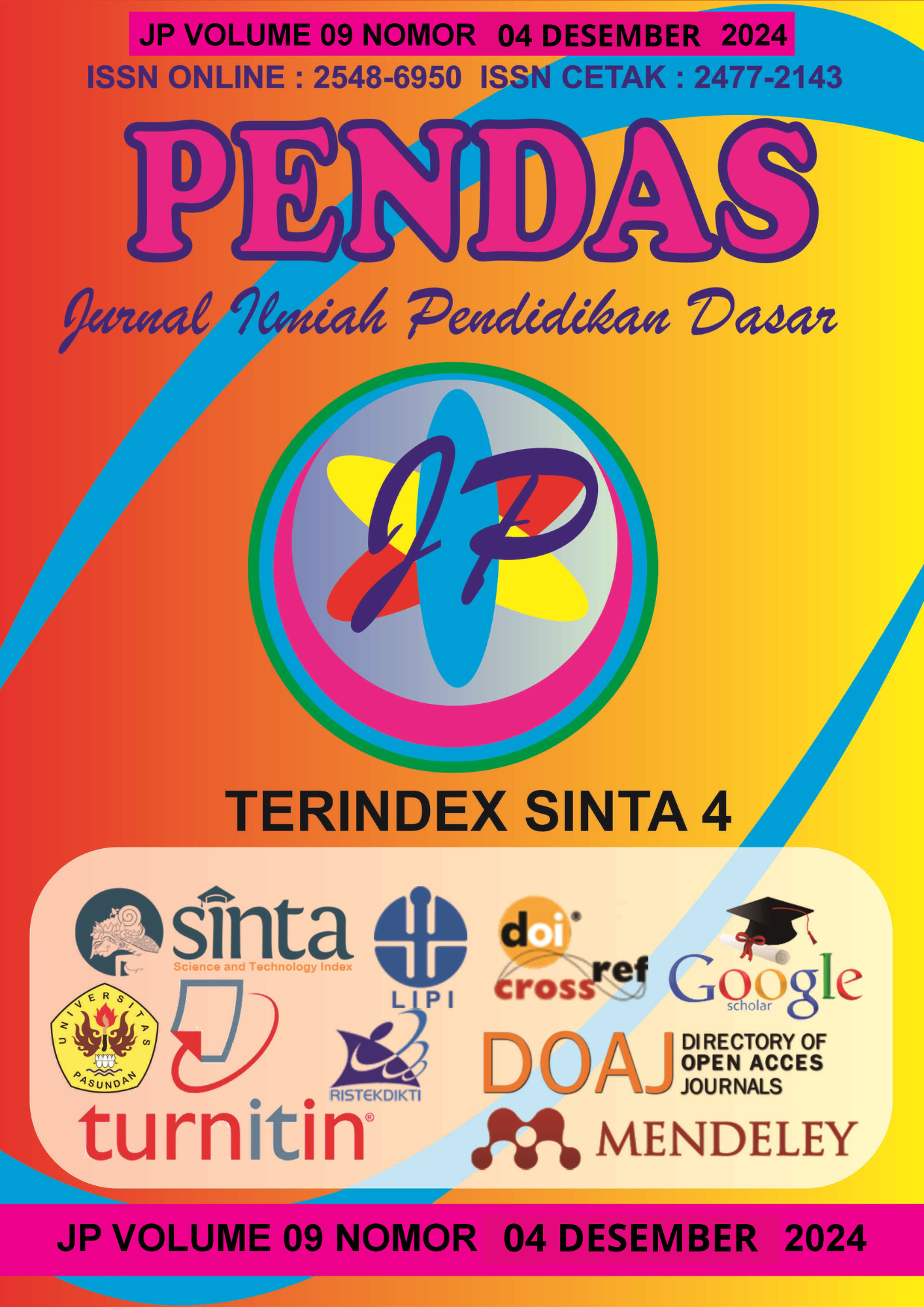IMPLEMENTASI KEGIATAN LSLC TERHADAP AKTIVITAS PESERTA DIDIK SEBAGAI DASAR MENENTUKAN MODEL PEMBELAJARAN
DOI:
https://doi.org/10.23969/jp.v9i04.18363Keywords:
student activities, guided inquiry, project based learning, Problem Based Learning (PBL)Abstract
This research aims to identify effective learning models through the implementation of LSLC activities that influence student activities. The research was carried out in three cycles, each involving two open classes. The research sample consisted of phase D students, especially grade 8 at SMP Negeri 34 Surabaya, in science and technology subjects. The student activity criteria were adapted from Singarimbun, which includes: 1) a score of 1 for very inactive; 2) score 2 for inactive; 3) score 3 for less active; 4) value 4 for active; and 5) score 5 for very active. Data was collected through observations by observers during open classes. Data analysis was carried out descriptively and quantitatively by describing the number and percentage of active students. The results of observations regarding student activities are discussed in reflection sessions and used as a basis for determining the next learning model. This research applies the Problem Based Learning (PBL) model using media such as pictures, colored objects, guided inquiry approaches, practice, role playing, and project-based models. The participation rate of active to very active students reached 95%, which is the highest result in the project-based model. Differences in activity were analyzed using One-Way ANOVA with the help of SPSS v25. The results of the analysis show an R Square value of 0.928, which shows that student activity has increased due to the influence of the learning model by 92.8%. "The ANOVA test shows a significance value (Sig) of 0.000, and the coefficient test also produces a Sig value of 0.000, which shows that the learning model has a significant influence on student activities."
Keywords: student activities, guided inquiry, project based learning, Problem Based Learning (PBL)
Downloads
References
Azizah, N., Studi Pendidikan Kimia FKIP UHO, P., & Autor, C. (2023). Penerapan Model Pembelajaran Inkuiri Terbimbing Untuk Meningkatkan Hasil Belajar Kognitif Siswa Kelas X IPA Di Sma Negeri 2 Kendari Pada Materi Ikatan Kimia. Jurnal Pendidikan Kimia FKIP Universitas Halu Oleo, 8(2), 109–118.
Bahren, B., Ramadhani, I., & Suroso, E. (2019). Membangun Keunggulan Bersaing Melalui Inovasi Produk, Inovasi Proses, Inovasi Marketing Dan Inovasi Organisasi Untuk Meningkatkan Kinerja Perusahaan. Jurnal Ekonomi Manajemen, 4(1), 8–18. https://doi.org/10.37058/jem.v4i1.689
Febriyana, M., & Winarti. (2021). Efektivitas Model Pembelajaran Berbasis Student Centered Learning untuk Meningkatkan Hasil Belajar Mahasiswa pada Mata Kuliah Microteaching. Jurnal EduTech, 7(2), 231–235.
Hobri, Ummah, I. K., Yuliati, N., & Dafik. (2020). The effect of jumping task based on creative problem solving on students’ problem solving ability. International Journal of Instruction, 13(1), 387–406. https://doi.org/10.29333/iji.2020.13126a
Istiqori, H., Fitriza, Z., & Haowraida, H. (2022). The Effect of LSLC - Based Problem Based Learning Model on Student Learning Outcomes on Atomic Structure Material – Nanomaterials for Class X SMA Penggerak. Journal of Educational Sciences, 6(4), 550. https://doi.org/10.31258/jes.6.4.p.550-560
Mahliatussikah, H., Silvia, E. E., Putri, A. Y., & Pratiwi, A. E. (2022). Penerapan metode pembelajaran Student Centered Learning (SCL) dalam pembelajaran di SDN Kedungpeluk 2 Sidoarjo. Jurnal Ilmiah Pendidikan Dasar, 9(2), 99. https://doi.org/10.30659/pendas.9.2.99-114
Marlina, R. (2018). Penerapan Lesson Study For Learning Community (LSLC) pada Mahasiswa Program Studi Pendidikan Biologi FKIP Universitas Tanjungpura. Proceeding Biology Education Conference, 15(1), 598–605.
Nursaptini, N., Nzobonimpa, C., Sobri, M., Novitasari, S., Indraswati, D., & Sutisna, D. (2021). Mentoring Children with Learning Difficulties in Inclusive Primary Schools. JPI (Jurnal Pendidikan Inklusi), 4(2), 85. https://doi.org/10.26740/inklusi.v4n2.p85-91
Rejeki, S., Humaira, H., Maryani, S., & Nizar, N. (2018). Lesson Study For Learning Community (LSLC): Pengalaman Berharga Dalam Pengelolaan Pembelajaran Secara Terbuka. INOPENDAS: Jurnal Ilmiah Kependidikan, 1(1), 54–60. https://doi.org/10.24176/jino.v1i1.2318
Singarimbun, Masri, & Effendi, S. (2006). Metode penelitian Survai. Lembaga Penelitian dan Penerangan Ekonomi dan Sosial Indonesia.
Suwarno, Auliah, A., & Babay, A. (2023). Pengaruh Media Kotak Kartu Misterius (KOKAMI) pada Model Pembelajaran Inkuiri Terbimbing terhadap Hasil bekajar Peserta Didik Kelas XI MIPA SMA Negeri 5 Makassar (Stusi pada Materi Pokok Laju Reaksi). Jurnal IPA Terpadu, 7(1), 128–135. http://ojs.unm.ac.id/index.php/ipaterpadu%0Ap-ISSN
Tanjung, I. K., Saragih, R. M. B., & Simamora, Y. (2023). Pengaruh Model Pembelajaran Inquiry Berbantuan Geogebra terhadap Kemampuan Pemahaman Konsep Matematis Siswa. Journal on Education, 6(1), 475–486. https://doi.org/10.31004/joe.v6i1.2287
Yusnita, N. cynthia, & Muqowim. (2020). Pendekatan Student Centered Learning dalam Menanamkan Karakter Disiplin dan Mandiri Anak di TK Annur II. Jurnal Ilmiah Potensia, 5(2), 116–126.
Downloads
Published
Issue
Section
License
Copyright (c) 2024 Pendas : Jurnal Ilmiah Pendidikan Dasar

This work is licensed under a Creative Commons Attribution 4.0 International License.














































